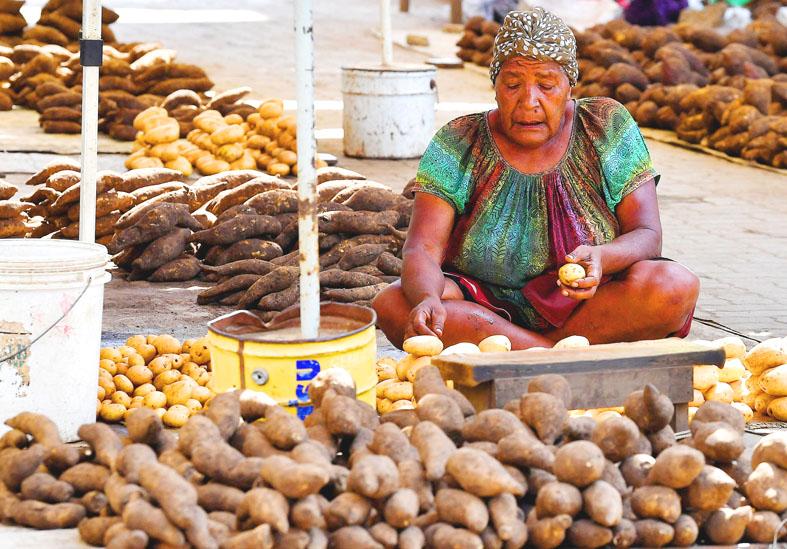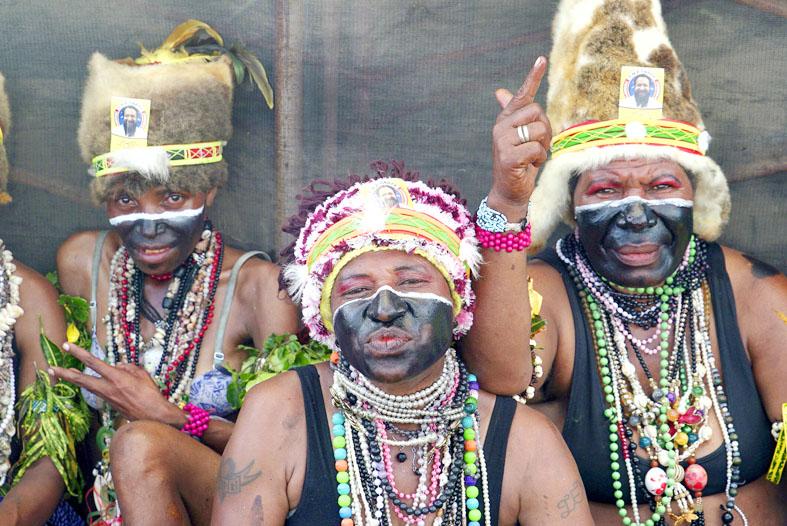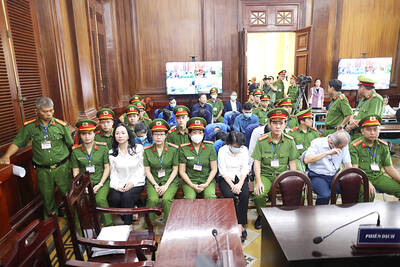Women are fighting to win at least one seat in Papua New Guinea’s (PNG) male-dominated parliament when voting opens tomorrow in a mountainous, forest-clad land scarred by gender-based violence.
Papua New Guinean Prime Minister James Marape is fending off a challenge from his predecessor Peter O’Neill to lead the resource-rich, but poverty-struck, Pacific Island for the next five years.
Whoever wins, the new leader will need to cobble together a coalition government, analysts say.

Photo: AFP
Women are hoping to have a voice in the 118-seat parliament.
In the nearly 50 years since Papua New Guinea gained independence from Australia, only seven women have ever secured a seat, and not one in the last election in 2017.
“A lot of us really feel like we stand a great chance,” said Sylvia Pascoe, one of 142 women among the almost 3,500 candidates in this election. “Not just because the timing is right, but because we’ve spent our lives building up to this moment.”

Photo: AP
Statistics on women’s experiences in the country are alarming: 63 percent have been subject to physical, sexual or emotional violence at the hands of their spouses, a national survey completed four years ago showed.
At least 70 percent of men and women agreed that a man would be justified in beating his wife in at least one of these circumstances: if she burnt food, argued, went out without telling her husband, refused sex or neglected her children.
Pascoe said that women were increasingly taking leadership roles in churches, sports and youth groups, and the “drought” in female representation in politics was sparking a change in sentiment ahead of the election.
“At the last elections, nobody was really out there rooting for women,” she said, but women are expressing a desire to vote for fellow women, and youth groups are singing songs in support of their runs for office.
“People only saw men being leaders. Then suddenly, there was a drought, and they said: ‘Something’s not right, there is no balance,’” Pascoe said.
Women in Papua New Guinea have found it hard to overcome perceptions that only men make leaders, said Jessica Collins, Pacific researcher at the independent Sydney-based Lowy Institute think tank.
There is now more public debate about women’s place in politics, with some young, determined female candidates running smart campaigns this year, Collins added.
“The chance for getting women elected to parliament this time around is probably increasing,” she said.
However, elections in Papua New Guinea can be dangerous.
At the 2017 general election, more than 200 voting-related killings were documented by monitors from the Australian National University.
Election malfeasance was “more brazen than ever before,” the monitors said in a report, citing “serious irregularities” such as voter intimidation and multiple voting.
For female candidates hard-pressed to secure financing, the risks can be even greater, said Pascoe, who sometimes ventures into volatile areas without the large security teams her male rivals enjoy.
So far, she had not encountered significant security issues, but Pascoe said that she had heard stories of crowds throwing stones and bottles at candidates.
“I was in a place the other night where the guy said they haven’t had water for a month,” she said.
“People are desperate,” and when they do not hear what they want from candidates, they can get upset, Pascoe said.
Australia has sent more than 130 troops with transport aircraft to provide security for the vote.
They are to assist the thousands of Papua New Guinean police and troops around the country, with the heaviest deployments in the remote and frequently violent highlands provinces.
Further complicating the process, the electoral roll is not up to date, Australian National University Pacific analyst Harry Ivarature said. “So the whole integrity of this election is already under question.”
Voting is scheduled to take place over 18 days, with the outcome not expected to be clear until next month.
Analysts say the battle to be prime minister could be tight as O’Neill calls for a revival of the resources sector, three years after resigning under pressure over corruption and a failure to spread mining wealth.
In an ethnically diverse country with more than 800 languages, there are few national issues to galvanize voters, and the overriding focus remains on what material benefits candidates can bring to local communities.
Women are hopeful that their voices can break through.
“We might just see a whole new empowered generation rising out of this,” Pascoe said.

Republican US lawmakers on Friday criticized US President Joe Biden’s administration after sanctioned Chinese telecoms equipment giant Huawei unveiled a laptop this week powered by an Intel artificial intelligence (AI) chip. The US placed Huawei on a trade restriction list in 2019 for contravening Iran sanctions, part of a broader effort to hobble Beijing’s technological advances. Placement on the list means the company’s suppliers have to seek a special, difficult-to-obtain license before shipping to it. One such license, issued by then-US president Donald Trump’s administration, has allowed Intel to ship central processors to Huawei for use in laptops since 2020. China hardliners

A top Vietnamese property tycoon was on Thursday sentenced to death in one of the biggest corruption cases in history, with an estimated US$27 billion in damages. A panel of three hand-picked jurors and two judges rejected all defense arguments by Truong My Lan, chair of major developer Van Thinh Phat, who was found guilty of swindling cash from Saigon Commercial Bank (SCB) over a decade. “The defendant’s actions ... eroded people’s trust in the leadership of the [Communist] Party and state,” read the verdict at the trial in Ho Chi Minh City. After the five-week trial, 85 others were also sentenced on

‘DELUSIONAL’: Targeting the families of Hamas’ leaders would not push the group to change its position or to give up its demands for Palestinians, Ismail Haniyeh said Israeli aircraft on Wednesday killed three sons of Hamas’ top political leader in the Gaza Strip, striking high-stakes targets at a time when Israel is holding delicate ceasefire negotiations with the militant group. Hamas said four of the leader’s grandchildren were also killed. Ismail Haniyeh’s sons are among the highest-profile figures to be killed in the war so far. Israel said they were Hamas operatives, and Haniyeh accused Israel of acting in “the spirit of revenge and murder.” The deaths threatened to strain the internationally mediated ceasefire talks, which appeared to gain steam in recent days even as the sides remain far

RAMPAGE: A Palestinian man was left dead after dozens of Israeli settlers searching for a missing 14-year-old boy stormed a village in the Israeli-occupied West Bank US President Joe Biden on Friday said he expected Iran to attack Israel “sooner, rather than later” and warned Tehran not to proceed. Asked by reporters about his message to Iran, Biden simply said: “Don’t,” underscoring Washington’s commitment to defend Israel. “We are devoted to the defense of Israel. We will support Israel. We will help defend Israel and Iran will not succeed,” he said. Biden said he would not divulge secure information, but said his expectation was that an attack could come “sooner, rather than later.” Israel braced on Friday for an attack by Iran or its proxies as warnings grew of